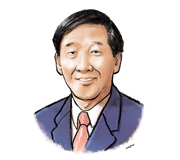Seoul-Tokyo chicken game
Seoul-Tokyo relations are at a historic low. Both governments have become hostages to the past. Things might even become worse before getting better unless they take remedial steps.
The latest episode is a condensation of the deep-rooted simmering blind nationalism engulfing the two countries.
South Korea cancelled its signing of the military information exchange pact with Tokyo last week. It was a complete PR disaster for President Lee Myung-bak. Lee underestimated the serious implications his hush-hush signing might entail.
President Lee belatedly acknowledged procedural mistakes. He said Monday that Korea has already signed such accords with 24 countries, including Russia. Lee also said Korea may strike a similar arrangement with China. He expects the National Assembly to endorse the signing after a review.
Even the ruling party opposed the proposal, calling it ill-timed as 2012 is an election year and parties become extra sensitive to public sentiment on whatever topic. Presidential candidates want to exploit public sentiment ― logical or emotional ― for their gains.
Democratic United Party Chairman Lee Hae-chan said that the main-opposition party would not accept the plan which he said goes against history. His party urged President Lee to dismiss Prime Minister Kim Hwang-sik for the fiasco.
Now Korea and Japan must ponder what went wrong. A sudden cancellation might be a diplomatic insult to Japan. Many Koreans had a knee-jerk reaction to the idea of military cooperation with Japan, which once held the Korean Peninsula under colonial rule. Talk of Japan going nuclear also incensed Koreans.
The two countries become so emotionally caught up in such endless chicken games that they often miss the point. Through textbook revision and tenacious publicity campaign, Tokyo leaders falsely claim sovereignty over Dokdo. Japan has waged an intensive global lobby to keep the Sea of Japan as the official name of what Koreans call the East Sea. They frustrated Seoul’s proposal to co-name the area as East Sea/Sea of Japan. Tokyo still does not acknowledge the comfort women whom Japan’s Imperial Army mobilized as sex slaves during the World War II.
Feelings are mutual. Anti-Japan sentiment seems to be at an all-time high in Korea. NGOs placed a bronze statue in front of the Japanese Embassy in Seoul that portrays a sorrowful young lady before the Japanese Imperial Army conscripted her into a brothel. It has become a rallying point for anti-Japan protestors. In retaliation, a Japanese ultra-right activist clandestinely placed a wooden stick near the statute. The stick stated that Dokdo was Japan’s territory.
Many Japanese people learn Korean, and they are enthusiastic fans of the Korean Wave. However, ultra-rightist groups in Japan organize rallies to prevent “Hallyu’’ stars from performing just for saying that Dokdo is part of the Korean territory.
These issues infuriate Koreans, who are now suspicious of whatever Japan does or says. In Korea, it is a taboo to become pro-Japanese. The pervasive `national sentiment law’ bars any pro-Japan advocate from holding public posts.
Many South Koreans deride Japan’s pitched offensive against South Korea as an attempt to divert attention from domestic woes.
Many foreigners are puzzled when Koreans belittle and despise Japan. From their point of view, Japan is still highly regarded because it is the world’s third largest economy. Despite its gargantuan fiscal deficit, Japan is still capable of maintaining its financial health. Korea is behind Japan in military spending. Japan is 2.6 times and 5.5 times as large as Korea in terms of population and its economy.
Korea and Japan have mutually benefitted from each other in recent decades. As Tokyo hosted the Summer Olympics in 1964, so Korea hosted the Seoul Olympics in 1988. Korea has adopted a conglomerate-led, export-oriented development strategy since the 1960s just as Japan did. Companies such as Samsung and LG would not have become what they are today without their Japanese competitors.
History shows that neighbors can seldom become friends. Some say Korea and Japan are like oil and water that don’t mix or like railways without a convergence point. Koreans may not recover from their postcolonial rule syndrome unless Japan stops hurting Koreans.
Moreover, the current ultrapatriotic and jingoistic sentiments may linger longer than people expect. Leaders, especially politicians, of the two countries have yet to refrain from enraging the public.
Logic has yet to prevail over emotionalism in bilateral relations. Japan may argue that Koreans need to overcome their `Japan complex,’ which is a byproduct of Japan’s colonial rule. Many Koreans say that Japan must rise above its `Korea complex,’—a besieged mentality as Korean exporters corner Japanese competitors and Hallyu continues to ‘invade’ Japan culturally.
Whatever perspectives they may have, the two countries have yet to restore cool-headedness and end verbal wars of attrition. Concrete steps are necessary to replace blind nationalism with wise nationalism.
Tokyo may be wise enough to stop tinkering with Korea’s territory and distorting history. Unless provoked, Koreans act sensibly. NGOs will be magnanimous enough to remove the statue from the street of the Japanese Embassy in Seoul.
The two countries have yet to know that the worst possible outcome will come when both fail to respect each other in endless hawk-dove games.
Former President Kim Dae-jung emphasized Korea-Japan amity. He said that the two countries had lived peacefully for the past thousand years. He added it was only for a period of half a century that they had been either at war or under the shadow of relations soured by the period of colonization. <The Korea Times/Lee Chang-sup>
Lee Chang-sup is the executive managing director of The Korea Times. Contact him at editorial@koreatimes.co.kr



